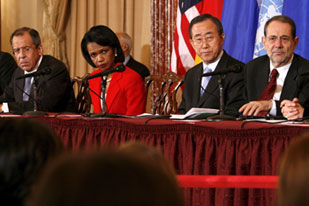Factfile: Middle East Quartet
The UN, Russia, US and EU drew up the road map peace plan for the Middle East.

 |
| The Quartet meets regularly to discuss the Middle East ‘road map’ [EPA] |
The Quartet is an informal grouping of countries and supernational entities involved in the mediating the Israeli-Palestinian peace process.
The Quartet includes:
– The United Nations, represented by Ban Ki-Moon, the secretary-general, who said in his opening address as the leader of the body that the Middle East was second only to Darfur in his list of priorities.
– The United States, represented by Condoleezza Rice, the secretary of state, is a close ally of Israel and supports the view that attacks by Palestinian fighters must stop before progress can be made.
– Russia, represented by Sergei Lavrov, the foreign secretary, has close ties with Israel where many Jewish emigrants live, but has also recently been trying to boost its relations with Arab nations.
– The European Union, represented by Javier Solana, the foreign policy chief, has always given strong support to the Palestinians through trade and aid, but relations with the government have been suspended since Hamas took power last year.
Quartet principals
In April 2002 the government of Spain, representing the rotating presidency of the European Union and Solana hosted Kofi Annan, then UN secretary-general, Colin Powell, then US secretary of state and Igor Ivanov, the Russian foreign minister.
These representatives, who had already met at the margins of the 56th General Assembly session in 2001, came to be known as the Quartet principals, who have since continued to meet regularly.
Their initial aim was to assist the Israelis and Palestinians to implement the Mitchell recommendations and the Tenet workplan. It was hoped these would bring an end to the violence of the Intifada, a Palestinian uprising against the Israeli occupation, which began in September 2000, and restart the peace process.
The Quartet then produced the “road map” which sets out the steps needed to achieve the vision of two states living side by side: a safe and secure Israel alongside a viable, sovereign and democratic Palestine.
At the announcement of the road map in September 2002, the Quartet said it would “continue to encourage all parties to step up to their responsibilities to seek a just and comprehensive settlement to the conflict based on UN Security Council resolutions … the Madrid terms of reference, the principle of land for peace, and implementation of all existing agreements between the parties”.
Three-phase plan
The three-phase plan was accepted by both sides in April 2003 and remains the primary blueprint and reference point for all efforts to end the Israeli-Palestinian conflict.
Diplomats and principal actors, such as the UN secretary general and the US secretary of state, meet regularly to discuss implementation of the “road map”.
Since Hamas took power after elections in January 2006 the Quartet has repeatedly called on the Palestinian government to renounce the use of violence, recognise Israel and respect previous international accords.
Large amounts of funding to the Palestinian people were withheld by donor nations and diplomatic relations suspended because of Hamas’s refusal to meet the Quartet’s conditions.
The Quartet has reacted cautiously to an agreement between Hamas and the Fatah movement of Mahmoud Abbas, the Palestinian president, to form a national unity government suggesting it will wait and see what form the government takes.